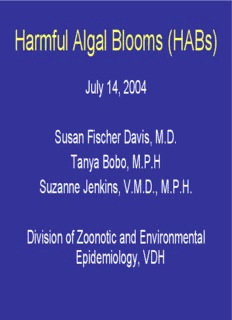
Harmful Algal Bloom Presentation PDF
Preview Harmful Algal Bloom Presentation
Harmful Algal Blooms (HABs) July 14, 2004 Susan Fischer Davis, M.D. Tanya Bobo, M.P.H Suzanne Jenkins, V.M.D., M.P.H. Division of Zoonotic and Environmental Epidemiology, VDH Algae = Phytoplankton • Microscopic organisms • Found in marine and freshwater • Major source of food and oxygen for wildlife • Several thousand species exist worldwide • ~70 – 80 species toxinproducing (dinoflagellates or diatoms) • 16 potential toxinproducing species in VA Toxinproducing algae dinoflagellates and diatoms • Unicellular, usually low concentration • Under certain conditions may proliferate (“blooms” or “red tides”) • May pose environmental, animal, and/or human health threat • Harmful Algal Blooms (HABs) Toxinproducing algae – dinoflagellates Toxinproducing algae – diatoms California Noctiluca Bloom Florida Red Tide Bloom of Karenia brevis Toxins produced by HABs • Heat stable • May accumulate in shellfish and finfish • May cause illness in humans when contaminated shellfish or fish are ingested Illnesses caused by HABs • Paralytic Shellfish Poisoning (PSP) • Diarrhetic Shellfish Poisoning (DSP) • Ciguatera Fish Poisoning (CFP) • Neurotoxic Shellfish Poisoning (NSP) • Amnesic Shellfish Poisoning (ASP) HABs geographic distribution, U.S.
Description: